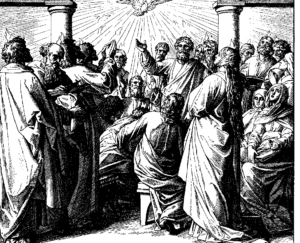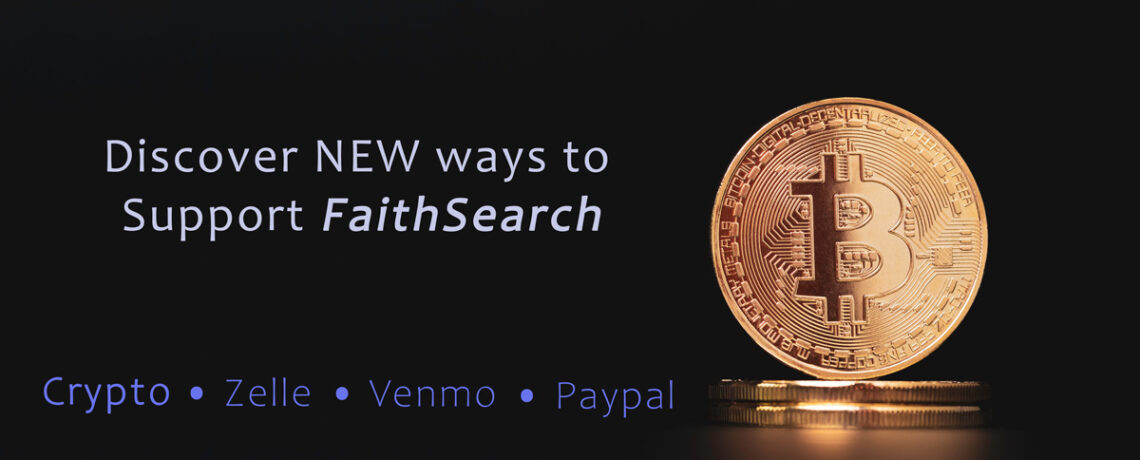By Dr. Don Bierle, FaithSearch President
[Editor’s note: Again, we will provide the promised Part 2 of “Is 2022 the Beginning of the End?” after Pentecost, in our next issue.]
The night before His crucifixion, Jesus spent the evening with His apostles, preparing them for their coming crisis of faith, which they would face following His death. One of His primary provisions was the gift of the indwelling Holy Spirit:
And I will ask the Father, and He will give you another Helper, that He may be with you forever; that is the Spirit of Truth… He abides with you and will be in you.
(John 14:16‑17)
“Another?” Who was the previous one? According to 1 John 2:1, it was Jesus Himself:
My little children, I am writing these things to you that you may not sin. And if anyone sins, we have an Advocate [παράκλητος (paraklētos)] with the Father, Jesus Christ the righteous.
(1 John 2:1)
“Advocate” and “Helper” are translated from the same Greek word, paraclete, from which we also take the title of this newsletter. It was used in the first century as a legal term – the one who is your representative in court, advocating for your cause. Jesus presently advocates for believers at the throne of God while the Holy Spirit is our advocate (paraclete) here on earth.
God is clearly and constantly “pulling” for us. Jesus even went so far as to say, “it is to your advantage that I go away” (John 16:7) so He could send the Holy Spirit to be in every believer and provide help simultaneously. (See 1 Corinthians 6:19.) Besides, the Holy Spirit’s ministry is many-fold, including: inspiration of Scripture (John 16:13-15); gifting and maturing believers (1 Corinthians 12:4,11; 2 Corinthians 3:18); and assisting in our mission of reaching the lost by convicting people of their sin (John 16:8).
Pentecost

(Public domain)
The Holy Spirit is typically identified with Pentecost which Christians celebrate fifty days after Passover. It is the occasion when Jesus’ promise of the indwelling Holy Spirit was fulfilled (Acts 2). In 2022, Pentecost is on June 5.
God established the physical Jewish feasts to have a remarkable anticipation of the subsequent spiritual meaning and understanding of the events. The first day of Passover was the Feast of Unleavened Bread since the Jews were required to purge their homes of leaven (identified with impurity). Subsequently, God revealed the spiritual meaning:
Clean out the old leaven [sin from our lives], that you may be a new lump, just as you are in fact unleavened. For Christ our Passover also has been sacrificed.
(1 Corinthians 5:7)
Jesus is our “unleavened bread” on which we feast. His sacrificial death and shed blood on the cross are what purifies and renders believers unleavened, forgiven of their sins: our Passover (Luke 24:46-47).
The second day after Passover God had instituted the Feast of First Fruits:
When you enter the land which I am going to give to you and reap its harvest, then you shall bring in the sheaf of the first fruits of your harvest to the priest. And he shall wave the sheaf before the Lord for you to be accepted; on the day after the sabbath the priest shall wave it.
(Leviticus 23:10-11)
The “day after the sabbath” was Sunday when Jesus rose from the dead as the sheaf of first fruits: “But now Christ has been raised from the dead, the first fruits of those who are asleep” (1 Corinthians 15:20). Our faith in the “sheaf of the first fruits,” Jesus Christ, which Christians celebrate on Easter, makes us acceptable to God.
The expression “first fruits” anticipates a full harvest that will come later. Again, God instituted the Feast of Weeks fifty days after Passover when the Jews were to present another wave offering in thanksgiving for God’s faithfulness to fulfill the harvest (Leviticus 23:16). God was anticipating what He was going to do fifty days after Passover – Pentecost – when the Holy Spirit generated a spiritual harvest of 3,000 who were saved and added to the Church (Acts 2:41).
Sealed and Pledged
Pentecost, then, was a very important historical event. Its spiritual meaning continues to have great significance. We read what accompanies our salvation:
In Him, you also, after listening to the message of truth, the Gospel of your salvation – having also believed, you were sealed in Him with the Holy Spirit of promise…”.
(Ephesians 1:13-14)

The Romans placed a seal on the tomb of Jesus to indicate their authority and ownership. Each person who repents and embraces Jesus through faith, He “seals” with the indwelling Holy Spirit to mark His possession. They belong to Him.
Since Pentecost the apostle Paul says that the Holy Spirit is given to each of us “as a pledge of our inheritance, with a view to the redemption of God’s own possession, to the praise of His glory” (v. 14). When purchasing a home, we are usually required to deposit earnest money as a guarantee that we will return at a future date to complete the purchase. The “pledge” in this verse is an earnest, except in this case the gift of the indwelling Holy Spirit is God’s earnest. It is God’s guarantee that Jesus will return someday to claim His own and complete our redemption by taking us to be with Him forever.
Living Water
Jesus wanted His gift of the Holy Spirit to be extremely desirable. His invitation is like the discovery of an oasis in the desert by a quenched traveler:
“If anyone is thirsty, let him come to me and drink. Whoever believes in me, as the Scripture has said, streams of living water will flow from within him. By this He meant the Spirit, whom those who believed in Him were later to receive”.
(John 7:37-39 NIV)
May we all drink deeply of Jesus’ free and precious gift!




